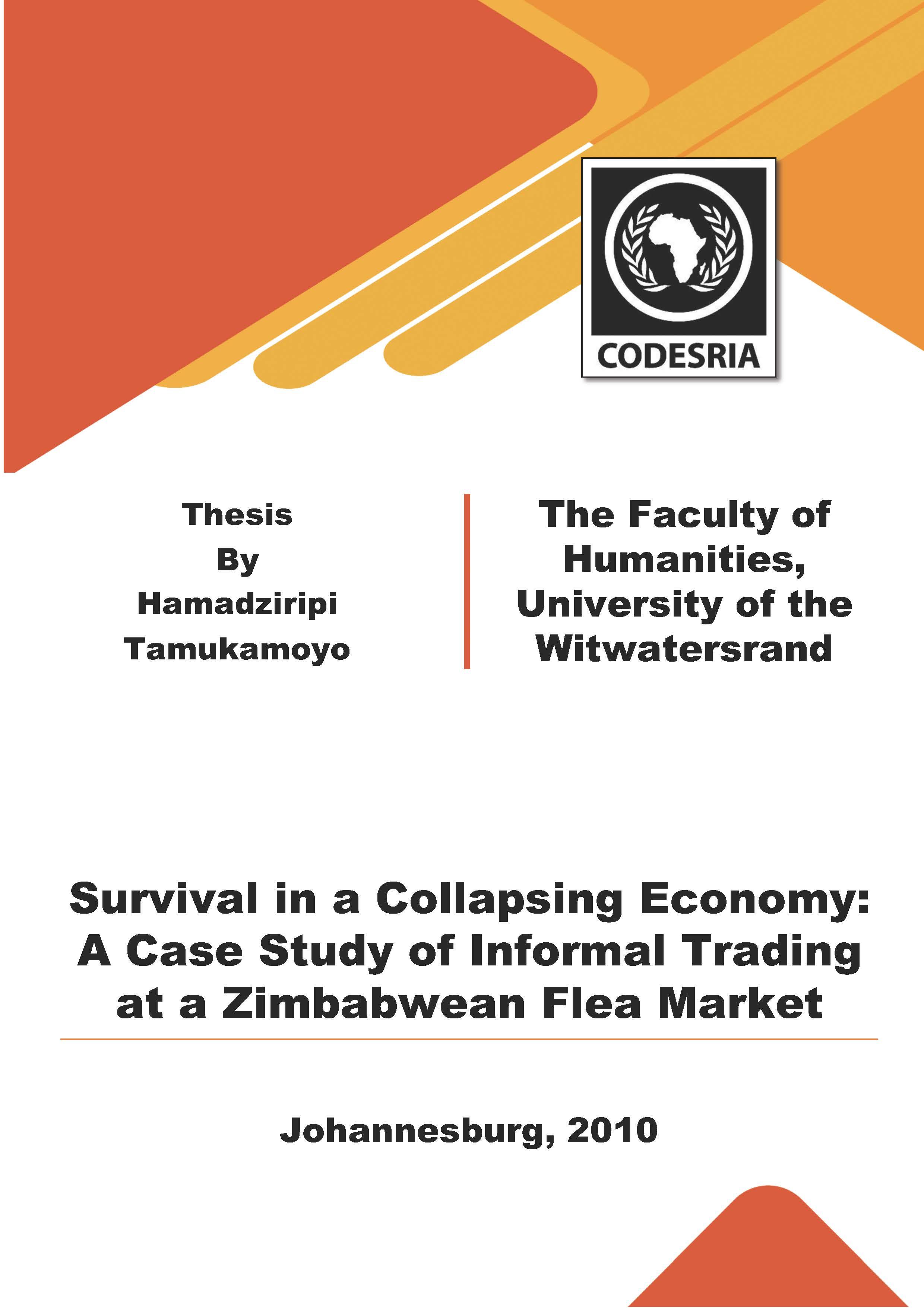Survival in a Collapsing Economy: A Case Study of Informal Trading at a Zimbabwean Flea Market
Keywords:
informal economic activities, informal traders, Harare, Zimbabwe, precariousness, globalisation, extended case method, localisation of the global, globalisation of the local, social networksSynopsis
The central concern of this study is the nature of informal economic activities among urban traders in Harare, Zimbabwe. The study focuses on a particular flea market and describes the precarious lives of a sample of informal traders. It is shown that, as through much of Africa, the market is a social as well as an economic nexus. It is not only the site of economic production and exchange constituting the survivalist activities that are increasingly important in the collapsing Zimbabwe economy, but also the site of diverse social relations. The thesis also shows that the formal and informal are part of the same deeply segmented economy and not two distinct, separate economies. The extended case study method is used to describe and analyse the nature of informal trading activities among traders dealing in four types of goods commonly found at the flea market: clothes and shoes, DVDs and video games, arts and crafts, and secondhand books. Primary and secondary sources, interviews with policy experts, researchers and activists, a total of 70 semi-structured interviews with traders and participant observation, over a period of one and a half years were used to obtain data on the nature of the informal economy in the current Zimbabwe crisis, and to profile these traders. The thesis describes the daily lives of the traders, their social characteristics and work histories, and the social relations of trust and reciprocity which enable them to source their goods. It is shown that the majority of the traders live an extremely precarious existence marked by low, unstable incomes.
However, they should not be viewed as passive victims of the economic crisis, as they demonstrate qualities of resourcefulness and innovation. Nor are they totally excluded from global circuits of production and exchange. Global connections are identified and shown to be relevant to the sourcing and sale of goods. These connections suggest an alternative way of conceptualising globalisation.
Downloads
References
Banda, I. 2007. Basic foodstuffs are now a hot commodity. Mail and Guardian, September 21 to 27.
Barlowe, M. and Clarke, T. 2002. Blue Gold: The Battle Against Corporate Theft of the World's Water. London: Earthscan.
Barr, A. 1998. Enterprise Performance and the Functional Diversity of Social Capital. Working Paper Series 98-1. Oxford: Institute of Economics and Statistics, University of Oxford.
Bass, L.E. 2000 “Enlarging the street and negotiating the curb: Public space at the edge of an African market” in International Journal of Sociology and Social Policy Vol 20, No 1/2. pp 76-97.
Bayart, J-F. 1999. The Social Capital of the Felonious State. In Bayart, J-F., Ellis, S. and Hibou, B. (eds.), The Criminalizaion of the State in Africa. Oxford and Bloomington: James Currey and Indiana University Press.
Bayart, J-F. 2000. Africa in the World: A History of Extraversion. African Affairs, 99(395): 217-267.
Beck, U. 2000. The Brave New World of Work. Cambridge: Polity.
Bhowmik, S.K. 2005. Street Vendors in Asia: A Review. Economic and Political Weekly, May 28: 2556-2264.
Boas, M. and Jennings, K.M. 2005. Insecurity and Development. The Rhetoric of the ‘Failed State’. The European Journal of Development Research,.17(3):.411–422.
Bond, P. 1998. Uneven Zimbabwe: A Study of Finance, Development and Underdevelopment. Trenton, NJ and Asmara, Eritrea: Africa World Press.
Bond, P. 1999. Capital in the City. In Raftopoulos, B. and Yoshikuni, T. (eds.), Sites of Struggle: Essays in Zimbabwe’s Urban History. Harare: Weaver.
Bond, P. and Manyanya, M. 2003. Zimbabwe’s Plunge: Exhausted Nationalism, Neoliberalism and the Search for Social Justice. Pietermaritzburg: University of Natal Press.
Bourdieu, P. 1985. The Forms of Capital. In Richardson, J.G. (ed.), Handbook of Theory and Research for the Sociology of Education. New York: Greenwood.
Bracking, S. and Sachikonye, L. 2006. Remittances, Poverty and the Informalisation of Household Wellbeing in Zimbabwe. Global Poverty Research Group, Working Paper Series No 045 Manchester: Global Poverty Research Group.
Bracking, S. and Sachikonye, L. 2008. Remittances, Poverty Reduction and Informalisation in Zimbabwe, 2005-2006: A Political Economy of Dispossession.
The University of Manchester, Brooks World Poverty Institute (BWPI) Working Paper No28.
Brand, V. 1986. One Dollar Workplaces: A Study of Informal Sector Activities in Magaba, Harare. Journal of Social Development. Volume 1 (2): 53-74.
Brand, V., Mupedziswa, R. and Gumbo, O. 1995. Structural Adjustment, Women and Informal Trade in Zimbabwe. In Gibbon, P. (ed.), Structural Adjustment and the Working Poor in Zimbabwe. Uppsala: Nordiska Afrikanstitutet.
Brautigam, D. 1997. Substituting for the State: Institutions and Industrial Development in Eastern Nigeria. World Development, 25(7): 1063-1080.






